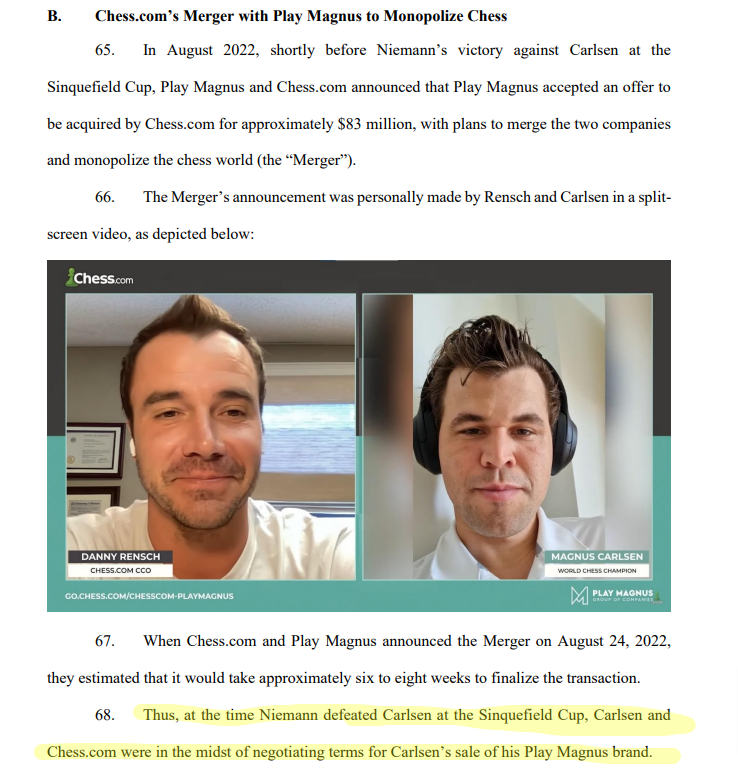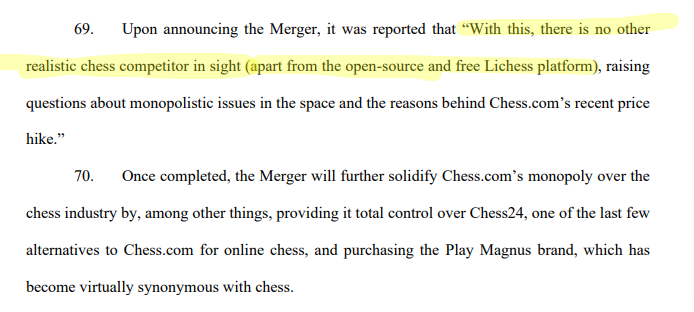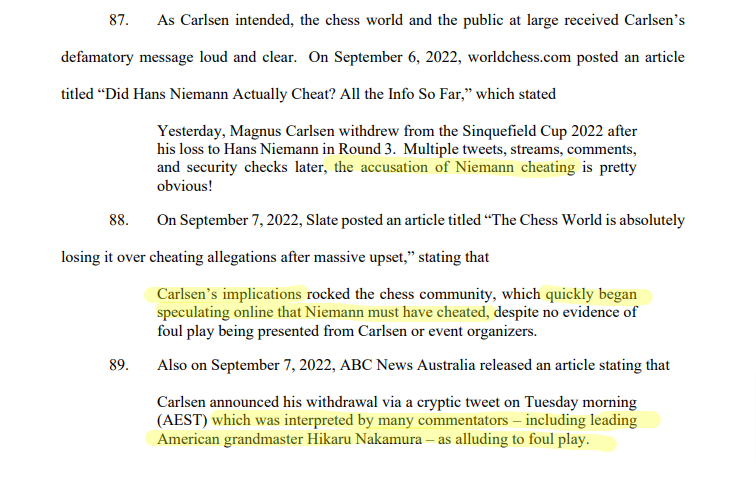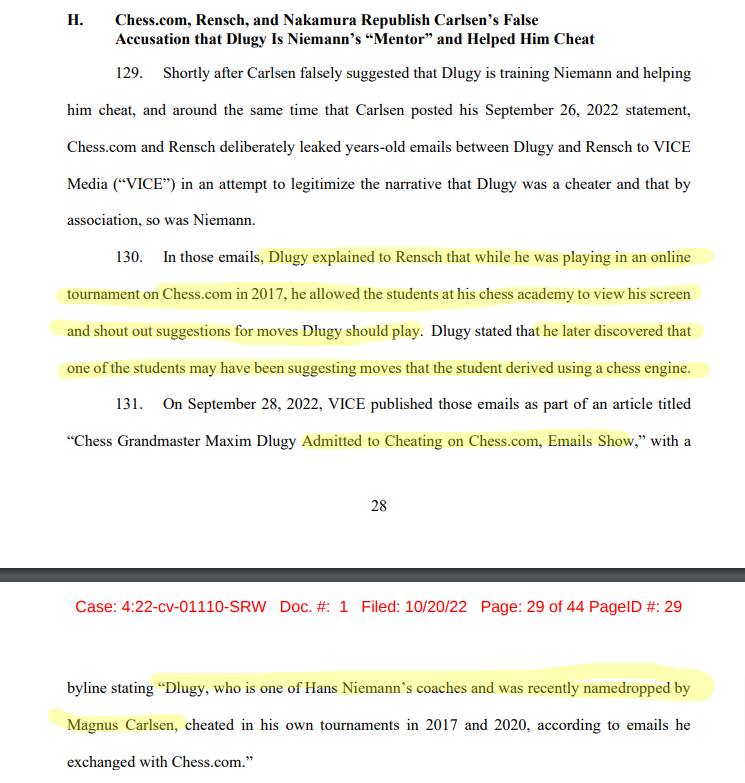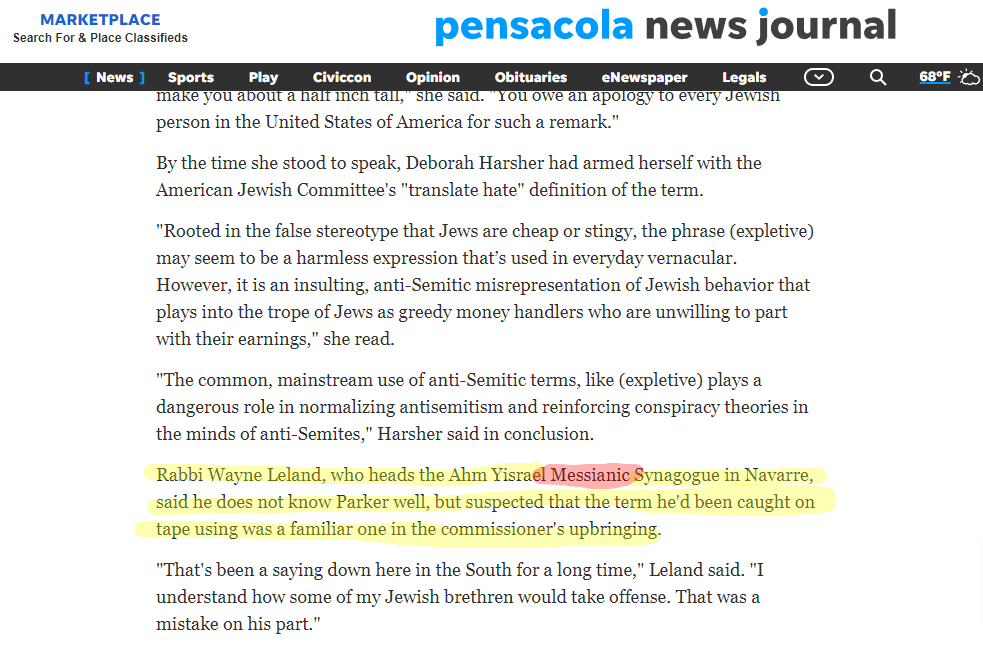OK, #LitigationDisasterTourists, by popular request (@yesh222 @ariehkovler @crowder and others) let's do a live read. I've got no idea whether what's pled here is viable or not - haven't even read it - but public figure defamation is about the hardest case to prove in US law.
https://twitter.com/HansMokeNiemann/status/1583164606029365248
Not only is that hard to believe on its own, it highlights the existence of a third-party chess expert who seems to think you cheated.
Maybe I'm missing something here but this really does seem like an unforced error
Maybe I'm missing something here but this really does seem like an unforced error
The next section is basically an "I'm so awesome at chess and I did it all on my own" brag-fest that isn't particularly interesting or important here, AFAICT. Again, if something later changes that, we'll come back to it
I'm sorry, but there's too much client-service in this complaint, and it doesn't land well enough. Right now, I know nothing about any of these people other than what's in the complaint and stuff like this just makes Niemann seem like an utter douchebag


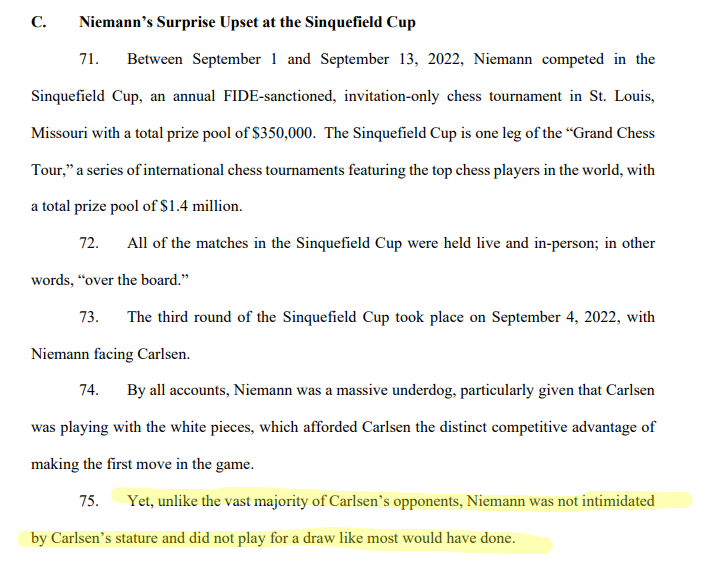

"Don't make your client unlikeable" is a pretty hard-and-fast rule of drafting complaints, right up there with "don't make allegations about other people's internal psychology unless you absolutely have to"
This ... is not good. Making a false cheating accusation immediately after losing is not going to be defamation, because it's a pretty clear opinion based on disclosed facts. "There's no way he could have done that without cheating" is an opinion. 
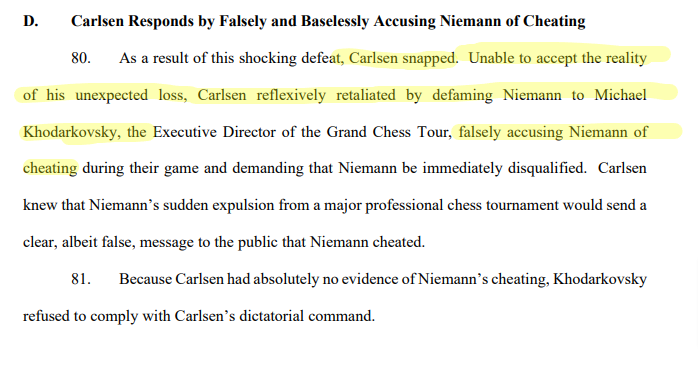
It may be a stupid opinion. It may be a wrong opinion. But it's an opinion, a conclusion reached based on the observed play, not a statement of fact. It can't be defamatory.
The only fact that any of this conveys is "Magnus Carlsen thinks Niemann cheated" - it's going to be very hard (if not impossible) to prove he didn't actually think that




I'm not sure how this satisfies the Twiqbal plausibility standard.
I mean, you're basically accusing Nakamura of being a co-conspirator for reaching and articulating the conclusion you just said was obvious from Carlsen's actions




I mean, you're basically accusing Nakamura of being a co-conspirator for reaching and articulating the conclusion you just said was obvious from Carlsen's actions



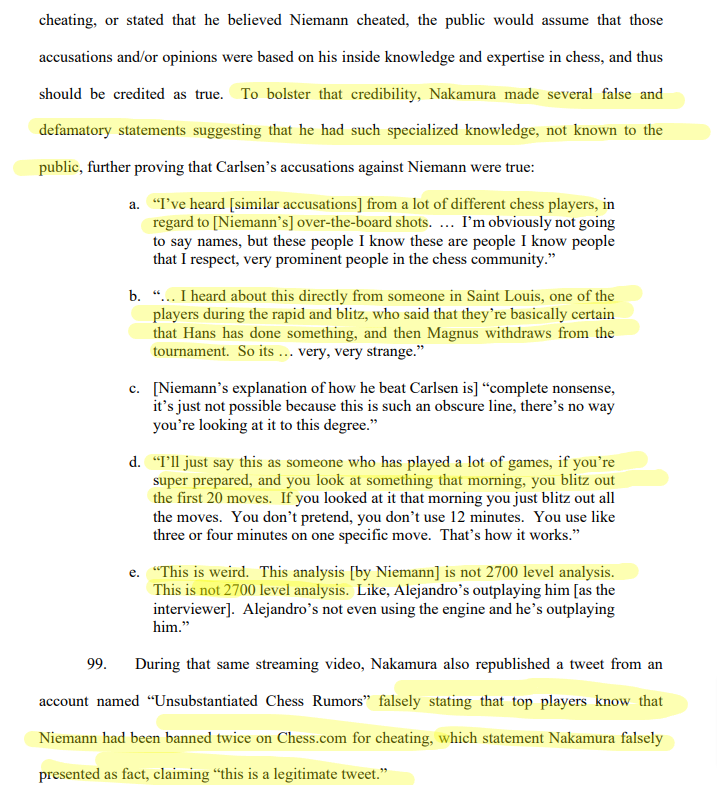
Look, if Nakamura literally made up the "I've heard from other people stuff" that's defamation. But otherwise, this isn't going to fly as defamatory; he's allowed to report what other people are telling him.






Honestly, this seems like a self-inflicted wound; they could've pled Nakamura as an example of someone convinced by Carlsen's lies/behavior. Instead, they've put themselves into a corner where they have to prove he's part of the conspiracy or take a major hit to their credibility
I would bet that this is a result of the client - a 19 year old kid who doesn't know anything about litigation - insisting that his lawyers sue Nakamura too. It's easy to say the lawyers should've talked him out of it, but sometimes the client refuses to hear reason.
Holy ... come on. ESPECIALLY when the client said this. How are you going to prove a defamation case against Nakamura when the client said "yeah, I did cheat in some online games a while ago"? 

This, on the other hand, is much more grounded and ABSOLUTELY a viable basis for a defamation claim if the statements were false. It's an opinion based on *undisclosed* facts - "we have information, which we're not sharing, that tells us he's been cheating way more than he said"




Seriously, this cannot possibly have been run through a lawyer familiar with defamation law. The absolute last thing you want to do in a situation like this is offer an opinion based on undisclosed facts
This, on the other hand isn't credible. Tie this accusation to the claim that they never provided you with the evidence they claimed to, not to "come on, this was so old"
'we ban cheaters' isn't evidence of a conspiracy
'we ban cheaters' isn't evidence of a conspiracy

They really should not be including this incident in the complaint. It adds nothing to the story or the legal claims or damages, as far as I can tell. "He implicitly doubled down on the accusation" isn't a new defamation claim. Why bother? 

Again, this entire case boils down to "did Carlsen actually believe Niemann cheated" - I haven't seen anything alleged that suggests he didn't. Lots of psychoanalysis, but no facts to support "he knew it was false" yet 

This detail changes the prior comment about "opinion based on undisclosed facts", btw. It then becomes an opinion based on disclosed facts, which can't be defamatory
https://twitter.com/GryphonWatcher/status/1583284620409569280
Finally, something from Nakamura that could be plausibly defamatory. Not sure what the damages would be, though 

Again, where's the actual malice. You need to allege and prove that Carlsen didn't actually believe what he was saying was true.




Next up is a section detailing various experts who said "Niemann didn't cheat at Sinquefield"
This is a good spot to break for the night. Will pick this up in the AM
OK, judging from the comments, there are a whole bunch of new folks in my mentions who don't necessarily have the familiarity with US defamation law or pleading standards that longtime tourists have. So here's what I'm going to do.
This tweet is a placeholder for a side thread of links to some of my older tweets (and some other people's) explaining what a "public figure" is for purposes of defamation law and what they need to allege and prove
https://twitter.com/AkivaMCohen/status/1583422003221975040
Rather than clutter the main-thread with a detailed backgrounder, later this morning I'll drop that info in replies to the nested tweet, so anyone who doesn't already know it can learn about it, but those of you who do don't have to wade through it again.
And here's a brief side-thread on what "Twiqbal" is all about
https://twitter.com/AkivaMCohen/status/1583424143382704128
Gonna spend a little time this morning beefing out the "actual malice" side thread, then get back to the live read
I don't understand what the lawyers are thinking here. You don't need any of this psychoanalysis, which just comes across as a reach. If the statements you're complaining about are false, you've got a potential claim. If they aren't, you don't, even if they wanted to hurt you 

You're taking on a burden of proof you didn't need, in a case where you've already got a high burden. I can't think of why you would want to do that
You can't sue over the headline the WSJ used. "You claimed I admitted something in a specific phone call, and that never happened", on the other hand, is enough of an allegation to survive a motion to dismiss even given the actual malice standard https://t.co/WmKmZplmi2Chess.com




Bottom line: it's a fact claim (he either did or didn't confess on the call) that, if false, the speaker likely knows is false (assuming he didn't say it, Rensch either knows it's a lie or is ...
genuinely but falsely remembering Niemann as saying that - and that last bit would be on Rensch to prove as a defense if Niemann could get a jury to believe he didn't say what was claimed). At the pleading stage, where the plaintiff's allegations are taken as true, that's enough
If his lawyers are smart, they'll try to hang the entire actual malice claim on this one fact: "we know they're deliberately lying about this one aspect of the case, therefore we can assume they're deliberately lying about everything else."
Only works against Chess/Rensch though
Only works against Chess/Rensch though
Just saying "it's frankly incredible" doesn't accomplish very much in the way of establishing a conspiracy




"Other people disagree" - even "other experts disagree" - does not make an opinion based on disclosed facts defamatory 

These are at least interesting facts, things that support an argument that Chess and Carlsen are not being truthful in their explanations for their behavior and thus warrant discovery. But it's undermined by the psychoanalysis




Then some more on Nakamura, and I really can't stress enough that pleading him as part of the conspiracy was a blunder. Even if you thought it was likely, you simply keep that in your back pocket until discovery gives you evidence of it. 

Next is a section on how Niemann has been damaged, which, frankly, yeah if he wasn't cheating he's pretty obviously been harmed
That brings us to the causes of action. They start with slander (spoken defamation), and oh dear god, no
This is a public figure defamation case. This isn't the time for your causes of action to say "as alleged above, it was all false and all knowingly false" 

The way this needed to be done was:
"On XYZ date, as alleged above, Carlsen said [statement]."
"That was false in that [detail falsity]"
"Carlsen knew that was false, because [describe factual basis for claim he knew he was lying]"
And then repeat for each statement & defendant
"On XYZ date, as alleged above, Carlsen said [statement]."
"That was false in that [detail falsity]"
"Carlsen knew that was false, because [describe factual basis for claim he knew he was lying]"
And then repeat for each statement & defendant
This is where the rubber meets the road, and it's absolute dot-your-i's-and-cross-your-t's time. You need to take the background and foundation you laid earlier in the complaint and distill it down to the specific factual allegations addressing each element for each statement
You can't just generally wave your hands at the prior sections and say "that. just, like, all of that"
Count 2 is for libel (written defamation) and it's pled identically: "like we said above, all the defendants wrote stuff [where did you allege Nakamura wrote ANYTHING, btw?], stuff is lies and they know it. Give us money"
Next we have the anti-trust claim, and it is not good.
Look, the "Twombly" in "Twombly-and-Iqbal"? It was an anti-trust case, dismissed because just alleging "they did similar things at the same time" isn't enough to allege "an agreement in restraint of trade"
Look, the "Twombly" in "Twombly-and-Iqbal"? It was an anti-trust case, dismissed because just alleging "they did similar things at the same time" isn't enough to allege "an agreement in restraint of trade"
Assuming the claim is viable at all, you'd need to allege facts that, if true, would support a jury finding that Chess and Carlsen entered into an agreement to blacklist Niemann. "They both won't play with me" isn't that. At all.




Also, I'm no anti-trust lawyer, but I have serious doubts that "we refuse to play against someone we believe cheated" or "we refuse to sponsor tournaments with someone we believe cheated" could ever be an antitrust claim. Niemann and aren't competitorsChess.com
Antitrust is enough of its own universe that I'll happily defer to any experienced antitrust attorney on this, but my gut says that this is a stretch too far. (Were this client work, I'd research it. Sorry)
Tortious interference, and Niemann hasn't actually alleged any conduct by any defendant directed at these entities, so I don't see how this claim survives. 

It's also functionally irrelevant, because it depends on the statements being defamatory (if Carlsen/Chess/Nakamura believed them to be true, there'd be no "tortious" interference in saying these things) and there's no separate damages being sought. So why bother?
Last, a civil conspiracy claim - that the defendants agreed with each other to do the bad acts. But there's no real allegation supporting the claim of an agreement; in the immortal words of Judge Chupp, 3 people all liking the same cat picture on the internet isn't a conspiracy
Anyway, here are my takeaways:
There is a potentially valid defamation claim (by which I mean "can survive a motion to dismiss") against - but that defendant probably isn't subject to suit in Missouri (nothing it allegedly did happened in MO)Chess.com
There is a potentially valid defamation claim (by which I mean "can survive a motion to dismiss") against - but that defendant probably isn't subject to suit in Missouri (nothing it allegedly did happened in MO)Chess.com
The claim against Carlsen is likely to get dismissed for a failure to plausibly allege actual malice; nothing in this complaint provides a basis to say Carlsen doesn't actually believe Niemann cheated.
The stuff against Nakamura is both dead letter on actual malice (on the current record) and filed in a court that has no jurisdiction over Nakamura
I suspect that there was a viable way to have brought this defamation case, potentially only against Chess in CT while indicating that claims against Carlsen and Nakamura might get added depending on discovery - but that this will not work as it's been pled.
That said, this doesn't appear to be a Mignogna-class lolsuit; there's material here that is at least potentially defamatory or tortious if intentionally false, and definitely damaging.
/fin
@wrtlbrmft issue were either *intentionally false* (i.e. "you knew this wasn't true but said it anyway) or *subjectively and seriously doubted at the time of the speech (i.e. "when you said it, you not only weren't sure it was true but thought it probably wasn't").
@wrtlbrmft That's from the Supreme Court's decisions in Times v. Sullivan and in St. Amant, which set the balance between defamation liability and the first amendment right to free speech
@ComposerBarton you get the chance to have your opponent need to make arguments like that
@EShipchaser @KathrynTewson @Dalton642 @formerdogmom And that's without even getting into the fact that you're a Ronald Jones believer (I'm so sorry)
• • •
Missing some Tweet in this thread? You can try to
force a refresh

